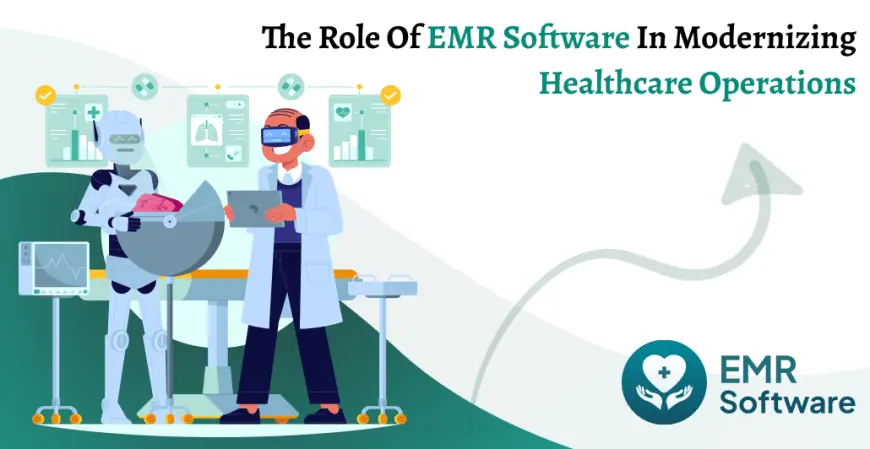The Role of EMR Software in Modernizing Healthcare Operations
Explore the role of EMR software in modernizing healthcare operations. Learn how it streamlines workflows, enhances patient data management, ensures compliance, and improves care quality. Discover how digital tools are transforming the future of healthcare delivery.

EMR Software has emerged as a landmark in the new generation of healthcare operation modernization and improvements. From easing out routine administrative tasks to clinching the best clinical productivity, the Electronic Medical Record systems have completely changed how the delivery of health services occurs, taking patient information in health facilities as their core aspect of dealing with this. This is what it puts on to make an article on EMR Software and revolutionize the face of healthcare in relevance, benefits, and those indispensable key features.
What is EMR Software?
EMR Software can also be described as an electronic application primarily used for the storage, sorting, and management of electronically maintained patient medical records. Unlike the old paper systems, electronic medical record systems provide easier access to any information needed by healthcare professionals accurately and up-to-date in nature. This reduces times wasted on errors and allows for the actual delivery of better care.
These will enormously decide and determine how the most excellent operations have enhanced about improving operations of managing operations in hospitals, clinics, and private practices. Hospital schedules are being created to add EMR systems for scheduling patients' accounts, billing, e-prescription, and clinical decision-making. All these will basically determine the efficient running of healthcare management.
EMR Software: Major Benefits of EMR Software
Improves Patient Care
All of this is available in real-time, from a patient's entire medical history to medication and lab records. This holistic view fosters informed decision-making, eliminates medical errors, and offers the best quality care.EMR systems reduce the workload of medical staff by automating routine administrative tasks. For example, scheduling of appointments, management of billing, and producing reports become streamlined with appropriate EMR Software Solution.
Better Data Security
One of the key concerns for any healthcare industry is the safety of the data. Latest EMR Software is designed to carry robust encryption and compliance that help protect patient information and do not allow any breach of that confidential information.
The use of an EMR system hospital can help save costs in large numbers by removing paper-based processes, reducing administrative overheads, and minimizing errors that result in financial losses.
Features of the Best EMR Software
The best EMR software will always be one that combines functionality, ease of use, and adaptability. Some of the standout features include:
User-Friendly Interface: An intuitive design makes the system easy to learn, so staff can use it quickly, without requiring much training.
Interoperability: the ability to integrate with all other healthcare systems and communicate data between departments easily.
Personalizable Templates: using templates specifically prepared for use by providers that outline relevant information in support of patient-specific specialties.
Real-Time Analytics: the high-powered reporting functionality built into EMR Software Solutions aids in real-time monitoring and determination of areas requiring performance enhancement.
How EMR Software Firms Shape Industry
With increased demand for AI-Powered EMR Software , numerous EMR software companies that cater to the needs of many different healthcare settings are on the rise. They continue innovating to suit the new needs of the provider and patients.
For example, some EMR systems have been specifically designed for large hospitals, but others have been designed for small clinics or specialized practices. This has ensured that healthcare providers in any form can find their solution that fits their uniqueness.
Why Every Healthcare Facility Needs an EMR System Hospital
Hospitals are fast-paced environments, and rapid and accurate information retrieval is a matter of survival. This EMR system hospital gives the advantage to be central to all data pertaining to the patients, hence smooth interdepartmental collaboration and also assisting in staying within the standards set.
Implementation of Electronic Medical Record systems aids hospitals shift from reactive to proactive treatment. Based on the analysis of data, hospitals are able to note trends, predict probable healthcare problems, and apply remedial measures before time thus better outcomes of patients.
Weaknesses and Solutions in Implementing EMR Software
Although the advantages of the EMR Software are there, its implementation is not entirely free of weaknesses. Among the most popular ones are:
-
High Set Up Costs: Installation of EMR Software Solution is costly, but in the long run, one saves and becomes efficient with the investment.
-
Resistance to Change: Staff will resist change to digital systems. Proper training and support by EMR software companies can handle this problem.
-
Data Migration: Converting from paper-based documents to electronic systems can be quite inconvenient. The right choice of the best EMR software with excellent tools for data migration makes it that much easier.
Future EMR Software in Healthcare
The future of EMR software in healthcare is expected to expand with advancements in technology. Artificial intelligence, machine learning, and perhaps even the ability to auto-detect conditions are soon likely to be incorporated into the EMR system to bring predictive analytics, individualized treatment plans, and, who knows, auto diagnosis.
Moreover, interoperability will enable different providers to share data, thus enabling smooth collaboration and continued care. Companies of EMR Software are already working to create solutions that utilize the cloud to provide access and scale for health care organizations all over the world.
Conclusion
One of the most significant strides toward healthcare operation modernization is EMR software adoption. The Electronic Medical Record systems are an integral part of the health care ecosystem with a guaranteed increase in efficiency, improved patient care, and data protection.It could be a small clinic looking for the best EMR software or a large hospital with a complete EMR system in a hospital. Benefits can easily be seen, as companies in the EMR software segment are continuously innovating towards a promising future of healthcare, where technology would be the key driver for evolution.












